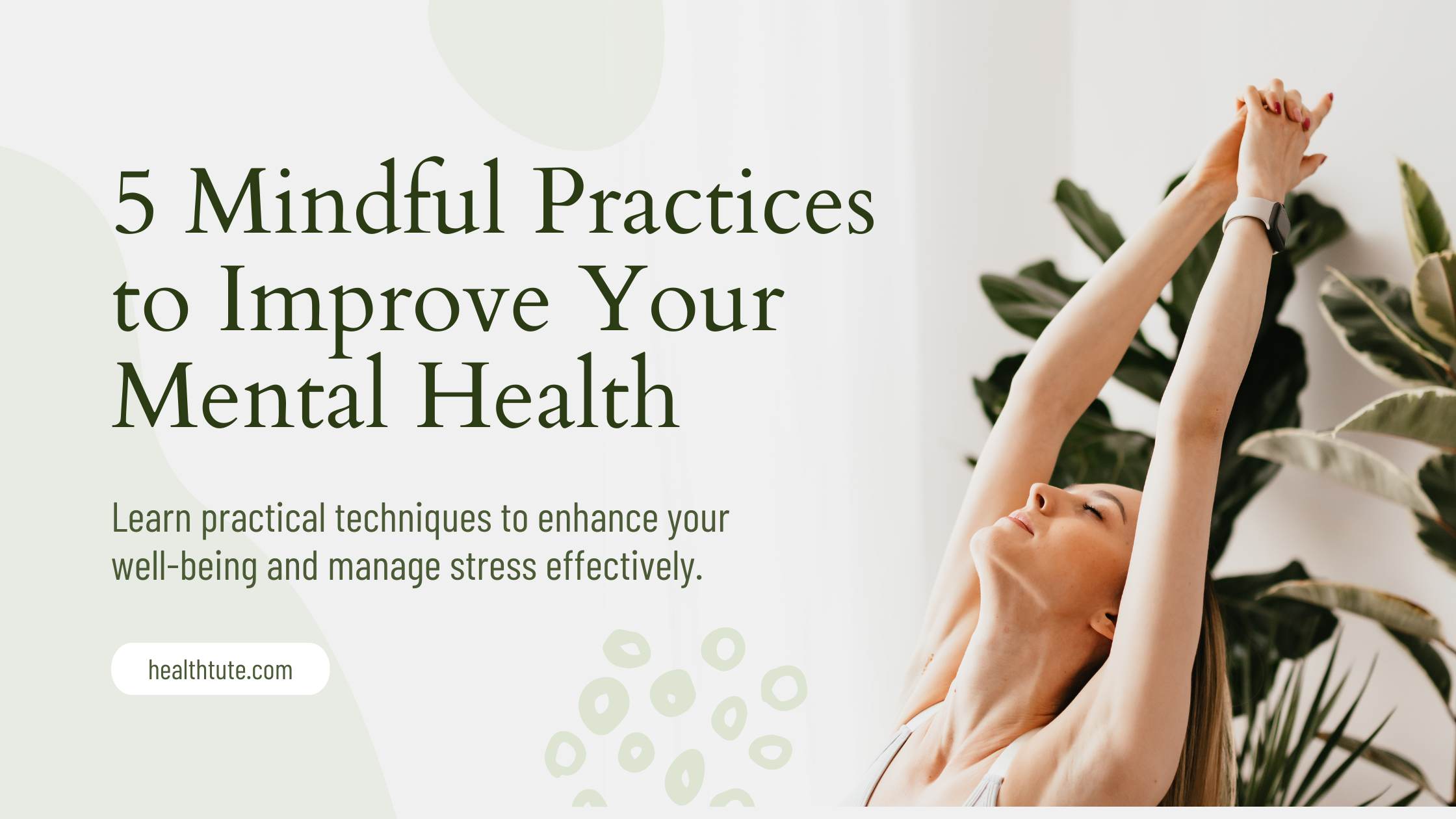In today’s fast-paced world, maintaining good mental health is essential for overall well-being. The demands of modern life can sometimes leave us feeling overwhelmed and stressed. However, by incorporating mindful practices into our daily routine, we can significantly improve our mental health. In this article, we will delve into five effective mindful practices that can positively impact your mental well-being.
5 Mindful Practices to Improve Your Mental Health
Mindfulness Meditation: Finding Calm Amidst the Chaos
Mindfulness meditation is a powerful practice that involves focusing your attention on the present moment. By doing so, you can reduce rumination and anxiety about the past or future. This practice encourages you to observe your thoughts and feelings without judgment. Regular mindfulness meditation has been shown to decrease stress, enhance emotional regulation, and increase overall feelings of well-being.
Gratitude Journaling: Cultivating Positivity
Gratitude journaling involves reflecting on the positive aspects of your life and jotting them down regularly. This practice shifts your focus away from negativity and trains your mind to appreciate the good things around you. Research suggests that practicing gratitude can lead to increased happiness and decreased symptoms of depression.
Physical Activity: Nurturing Your Body and Mind
Engaging in regular physical activity not only benefits your physical health but also has a profound impact on your mental well-being. Exercise triggers the release of endorphins, also known as “feel-good” hormones, which can boost your mood and reduce stress. Whether it’s going for a walk, practicing yoga, or hitting the gym, find an activity that you enjoy and make it a part of your routine.
Deep Breathing Exercises: Finding Calm in Every Breath
Deep breathing exercises are simple yet effective techniques that can instantly calm your mind and reduce anxiety. By taking slow, deep breaths, you activate the body’s relaxation response, which counteracts the stress response. Incorporate deep breathing into your daily routine, especially during moments of tension or unease.
Digital Detox: Unplugging for Mental Clarity
Constant digital connectivity can contribute to information overload and increased stress. Taking regular breaks from screens, also known as a digital detox, allows your mind to rest and recharge. Set aside designated times to disconnect from devices, engage in activities you enjoy, and connect with the present moment.
Incorporating Mindful Practices into Your Routine
By integrating these mindful practices into your daily routine, you can experience significant improvements in your mental health. Start with small, manageable steps and gradually increase your practice as you feel comfortable. Remember that consistency is key, and over time, you’ll likely notice positive changes in your overall well-being.
FAQs about Improving Mental Health
How long does it take to see results from mindfulness meditation?
Results from mindfulness meditation can vary from person to person. Some individuals report feeling a sense of calm after just a few sessions, while others may take a few weeks to experience noticeable changes. Consistency and patience are important when practicing mindfulness meditation.
Can gratitude journaling help with severe depression?
Gratitude journaling can be a helpful complementary practice for individuals experiencing depression. However, it’s important to note that severe depression often requires comprehensive treatment, including therapy and possibly medication. Consult a mental health professional for personalized guidance.
Is there an ideal time of day to engage in physical activity for mental health benefits?
The best time to engage in physical activity is when it fits into your schedule and when you can commit to it consistently. Some people prefer morning workouts to start the day with energy, while others find that evening workouts help them unwind. Choose a time that aligns with your preferences and lifestyle.
Can deep breathing exercises replace the need for professional help in managing anxiety?
Deep breathing exercises can be a helpful tool for managing mild to moderate anxiety. However, if you’re experiencing severe or persistent anxiety, it’s crucial to seek guidance from a mental health professional. They can provide you with appropriate strategies and interventions tailored to your needs.
How can I make a digital detox more achievable?
Making a digital detox achievable involves setting clear boundaries and gradually reducing screen time. Start by designating specific hours as screen-free periods and gradually extending them. Engage in activities that don’t involve screens, such as reading a book, spending time outdoors, or practicing a hobby.
Are these practices suitable for children and teenagers?
Yes, these mindful practices can benefit individuals of all ages, including children and teenagers. However, it’s important to introduce these practices in an age-appropriate manner. For children and teenagers, mindfulness exercises can be adapted to their developmental level, and parental guidance is recommended.
Conclusion
Incorporating mindful practices into your daily routine can have a transformative impact on your mental health. From mindfulness meditation to gratitude journaling and physical activity, these practices offer practical ways to reduce stress, enhance positivity, and nurture your overall well-being. Remember that improving mental health is a journey that requires patience and self-care. By taking proactive steps towards mindfulness, you can cultivate a healthier mind and a happier life.

